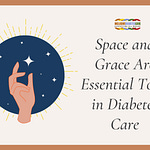Diabetes is a chronic disease that can come with various complications, leading to concerns and fears among patients. As healthcare professionals, it is important to share research and treatment options about these complications in a way that empowers clients without unintentionally supporting healthism or ableism. Understanding terms like ableism and healthism can help you avoid decentering and devaluing people with diabetes.
How do ableism and healthism intersect with diabetes care?
Ableism refers to practices that treat people with disabilities as less than human.
Healthism promotes the idea that everyone should strive for the same vision of health.
Consider
The history of disability rights legislation.
Personal experiences of ableism.
Strategies for recognizing and confronting ableism in healthcare.
The importance of accessibility.
The impact of words and imagery on people with disabilities.
Are your clients fearing “what might happen because of diabetes? As healthcare professionals, do you know how to share research and treatment options about complications associated with diabetes in a way that empowers your clients? Can you talk about these concerns without unintentionally supporting healthism or ableism?
We know that this nuanced discussion is essential for inclusive diabetes care because ableism and healthism impact your patients, erode your effectiveness, and decrease patient
trust.
You don't want to wait! Attending this program, you will learn the following:
What is ableism?
What is healthism?
How Ableism and Healthism can decenter the person with diabetes
Understanding these key terms will help you avoid decenter and devalue people who cannot focus on ‘being healthy,’ including people with diabetes who may be dealing with diabetes stigma, distress, and burnout or are struggling with internalized weight stigma. These terms are defined in the course.
Learning objective: Participants will be
Identify two ways Ableism is present in healthcare
List two examples of Healthism in diabetes care
State two ways these two concepts intersect with diabetes
Megrette Fletcher has no conflicts to disclose
Performance Indicators
8.2.1 Engages in educational activities to maintain knowledge and to obtain new knowledge of diseases and clinical conditions.
9.3.5 Uses a variety of strategies to deliver education.
9.6.8 Develop counseling or coaching goals in collaboration with clients.
CDR : 179494
1 CPE awarded from CDR when completed by 9/26/26













Share this post